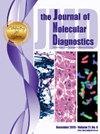Clinical Bioinformatician Body of Knowledge—Clinical Laboratory Regulation and Data Security Core
IF 3.4
3区 医学
Q1 PATHOLOGY
引用次数: 0
Abstract
Clinical bioinformaticians have come to play an essential role in clinical molecular diagnostic laboratories. However, the core knowledge needed for the clinical practice and training of this emerging group of professionals has not been previously established. Clinical laboratories are subject to a complex set of legal and accreditation requirements from numerous governmental and nongovernmental bodies that cover the generation, processing, storage, and distribution of patient data in the form of test results and intermediate data files. Clinical bioinformaticians are intimately involved in the development and maintenance of systems that perform these activities. This third article in the Association for Molecular Pathology's Clinical Bioinformatician Body of Knowledge Core series presents a body of knowledge for the clinical bioinformatician describing relevant laboratory regulations and data security in the domains of hardware, software, networks, and interoperability. Although this article does not substitute for legal counsel, it provides a resource for clinical bioinformaticians to identify and familiarize themselves with regulations affecting their professional functions within the laboratory.
临床生物信息学家知识体系-临床实验室法规和数据安全核心:分子病理学协会的报告。
临床生物信息学家在临床分子诊断实验室中起着至关重要的作用。然而,临床实践和培训这一新兴专业群体所需的核心知识尚未建立。临床实验室受到众多政府和非政府机构的一套复杂的法律和认证要求的约束,这些要求涵盖了以测试结果和中间数据文件的形式产生、处理、存储和分发患者数据。临床生物信息学家密切参与执行这些活动的系统的开发和维护。这是分子病理学协会临床生物信息学家知识体系核心系列的第三份手稿,为临床生物信息学家提供了一个知识体系,描述了硬件、软件、网络和互操作性领域的相关实验室法规和数据安全。虽然这份手稿不能代替法律顾问,但它为临床生物信息学家提供了一个资源,以识别和熟悉影响他们在实验室专业功能的法规。
本文章由计算机程序翻译,如有差异,请以英文原文为准。
求助全文
约1分钟内获得全文
求助全文
来源期刊
CiteScore
8.10
自引率
2.40%
发文量
143
审稿时长
43 days
期刊介绍:
The Journal of Molecular Diagnostics, the official publication of the Association for Molecular Pathology (AMP), co-owned by the American Society for Investigative Pathology (ASIP), seeks to publish high quality original papers on scientific advances in the translation and validation of molecular discoveries in medicine into the clinical diagnostic setting, and the description and application of technological advances in the field of molecular diagnostic medicine. The editors welcome for review articles that contain: novel discoveries or clinicopathologic correlations including studies in oncology, infectious diseases, inherited diseases, predisposition to disease, clinical informatics, or the description of polymorphisms linked to disease states or normal variations; the application of diagnostic methodologies in clinical trials; or the development of new or improved molecular methods which may be applied to diagnosis or monitoring of disease or disease predisposition.

 求助内容:
求助内容: 应助结果提醒方式:
应助结果提醒方式:


